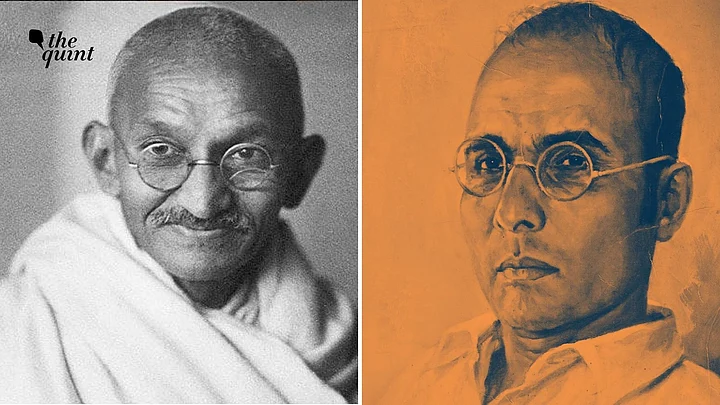At a launch event of a book on VD Savarkar in New Delhi on Tuesday, 12 October, Union Minister Rajnath Singh claimed that Savarkar had filed mercy petitions before the British government on the advise of Mahatma Gandhi.
"There were lies spread about Savarkar. It was being said that he had filed several mercy petitions before the British government while he was imprisoned. But the truth is, he did not file the mercy petitions to get released from prison. It is a right of a prisoner to file mercy petitions. In fact, Mahatma Gandhi told him to file the mercy petitions."Union minister Rajnath Singh
But were all the petitions filed on Gandhi's suggestions? Did Gandhi tell Savarkar to ask for mercy? Let's take a look at the timeline of these pleas filed by VD Savarkar and Mahatma Gandhi's link with them.
SAVARKAR FILED FIRST MERCY PETITION IN 1911
Scholar, lawyer and author AG Noorani's article published on Frontline in 2005 detailed a list of mercy petitions filed by VD Savarkar from 1911 onwards.
In 1911, Savarkar reportedly submitted a mercy petition within six months after he was lodged in the Cellular Jail, Andaman and Nicobar islands, in July 1911.
On 14 November 1913, he submitted a second petition for mercy. The Frontline article noted that Sir Reginald Craddock, the Home Member of the Viceroy's Executive Council, in his note dated 23 November 1913 mentioned Savarkar's petition for mercy.
Next, responding to a question asked in the Imperial Legislative Council in 1920, Home Member Sir William Vincent reportedly said that they had received two petitions from Vinayak Damodar Savarkar in 1914 and 1917. "Thus there was one in 1917 besides that of 1913 which is perhaps the one Vincent referred to as one of 1914; perhaps not because Savarkar referred to two others of 1914 and 1918," the Frontline article stated.
WHAT IS THE LINK BETWEEN GANDHI & SAVARKAR'S PETITIONS?
Mahatma Gandhi, who went to South Africa in the capacity of a lawyer, came back to India on 9 January 1915, which is four years after the first mercy petition was filed by Savarkar.
As per the records available on Gandhi Sevagram Ashram, in response to a letter written by Dr Narayan Damodar Savarkar (younger brother of VD Savarkar) on Savarkar brothers' release, Gandhi wrote on 25 January 1920:
"I have your letter. It is difficult to advise you. I suggest, however, your framing a brief petition setting forth the facts of the case bringing out in clear relief the fact that the offence committed by your brother was purely political. I suggest this in order that it would be possible to concentrate public attention on the case. Meanwhile as I have said to you in an earlier letter, I am moving in the matter in my own way."
It is pertinent to note that as per the index of this document, the details of the "earlier letter", as mentioned by Gandhi, aren't available.
Later, on 26 May 1920, Mahatma Gandhi wrote in Young India that while many people who were then imprisoned were discharged, however, the Savarkar brothers – Ganesh Damodar Savarkar and Vinayak Damodar Savarkar – didn't receive the same benefit.
"They are political offenders in the same sense as men, for instance, who have been discharged in the Punjab. And yet these two brothers have not received their liberty although five months have gone by after the publication of the Proclamation," the article available on Page 369 of Volume 20 of 'Collected Works of Mahatma Gandhi' stated.
HISTORIAN, POLITICIAN & FILMMAKER TAKE A DIG AT RAJNATH SINGH'S CLAIM
Historian S Irfan Habib called out the claim made by the union minister.
AIMIM President Asaduddin Owaisi shared Mahatma Gandhi's letter written in 1920 and wrote, "Here’s the letter to Savarkar from Gandhi. No mention of petition to British begging for leniency, mercy & promising to be a faithful servant of the crown. (sic)"
Filmmaker Rakesh Sharma, too, pointed out that Savarkar had written a petition before Gandhi had returned to India from South Africa.
(At The Quint, we question everything. Play an active role in shaping our journalism by becoming a member today.)
